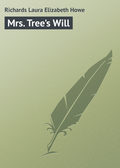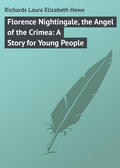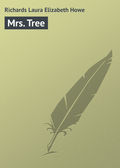
Laura Richards
Three Minute Stories
LITTLE GIRL
When Little Girl wakes in the morning gay
Then everybody is glad;
The cat in the kitchen sits purring away,
And the puppy dog barks like mad.
The bell in the steeple turns head over heels,
That’s his way of showing how glad he feels;
And all the wide world seems to say,
“Our dear Little Girl is happy to-day!”
When Little Girl wakes in the morning sad,
Then everybody must mourn;
The little birds sigh, and the big birds cry,
And the scarecrow sobs in the corn.
The fishes all pull their hankies out,
And go and weep with the poor hornpout,
And the clock says, “Tock! I’m sorry to say
Our dear Little Girl is sad to-day!”
So, Little Girl, when you go beddy at night,
Put a smile right under your pillow,
And when you wake up, just slip it on tight,
And wear it all day with a will, oh!
Then the sun will shine and the wind will blow,
And the bells will ring, “Ho! ho! ho! ho!”
For in all the wide world there’s naught can be
So sweet as a happy child to see!
HOW MR. PEACOCK WENT TO THE FAIR
(Adapted)
Mr. Peacock was proud. He had a fine long train, a splendid crest, and the gayest blue-green coat that ever was seen; and all day long he would strut up and down the barnyard and say: “See what a beauty I am!”
The geese and ducks and turkeys were much displeased at this. “Beauty, indeed!” they said. “Of what use is your beauty? Can it hatch eggs? Tell us that!” and they turned their backs and walked away.
“These are stupid creatures!” said Mr. Peacock. “Why should I stay among them? I will go to the Fair, for there people will see my beauty and admire it.”
So he spread his tail like a fan, raised his crested head and strutted off down the road to the Fair. Pretty soon he met some young men who also were going to the Fair. “Aha!” said Mr. Peacock. “These people will admire me!” and he strutted more than ever.
“Look!” said the young men. “What a fine peacock, and what splendid feathers he has! They are just what we want for our hats.” They surrounded Mr. Peacock, and, spite of his screams of rage and terror, tore out three or four of his finest tail feathers and went away laughing. Presently he fell in with a large flock of geese which a boy was driving to the Fair to sell. He spread his tail and tried to push his way to the head of the flock, but they took no notice of him and waddled steadily on, keeping close together.
“Make way, you stupid creatures!” said Mr. Peacock. “Keep your dirty feet off my fine train!”
“Quack!” said an old gray goose, the grandmother of the flock. “Keep your train out from under our feet, Mr. Strut! Who asked you to join our company?”
“Join your company, indeed!” cried Mr. Peacock. “Get out of my way, you rude, clumsy thing, and learn how to treat your betters!” and he gave the goose a hard peck.
When the other geese, who loved their grandmother, saw this, they all fell upon Mr. Peacock and beat and pecked and hustled him till he ran screaming away, dragging his tail behind him.
He was now in a sad way, covered with dust, and many of his finest feathers were torn and broken; but still, when he came to the Fair he spread his tail, reared his crest and made as much of himself as he could.
“I am still handsomer than any one else!” he said, “and people will be sure to admire me.”
“Look there!” said a man. “There is a peacock. Let us kill and stuff him and add him to our show.” And he chased Mr. Peacock, who ran off screaming with terror. Coming around a corner he ran into a large dog who was coming the other way.
“Get out of my way!” screamed Mr. Peacock.
“Get out of mine!” growled Mr. Dog, and he grabbed Mr. Peacock by the neck, shook him hard and tore out a great mouthful of feathers.
More dead than alive, the poor Peacock ran and ran and ran, and never stopped till he got home.
The geese and turkeys looked at him in great surprise. “Who is this wretched, shabby bird?” they asked each other. “It cannot possibly be Mr. Peacock?”
“Yes,” sobbed the poor creature, “it is I; but I have left my pride behind. If you will only let me stay with you I will do my best to hatch eggs.”
But he never could.
LITTLE BOY
Mother, the hen is cackling;
What is she trying to say?
She says, “Cluck! cluck! I humbly beg
To tell you all I’ve laid an egg
For Little Boy to-day!”
Oh! oh! is it so?
Truly now, I did not know!
But in return what shall I give?
“Be kind, be kind, to all that live!”
Mother, the cow is lowing;
What is she trying to say?
“Milk and cream and butter and cheese,
Good people, I have brought you these
For Little Boy to-day.”
Oh! oh! is it so?
Truly now, I did not know!
But in return what shall I give?
“Be kind, be kind, to all that live.”
Mother, the sheep is bleating;
What is she trying to say?
She says “I’ll give my fleecy wool
To make warm clothes for play and school
For Little Boy to-day.”
Oh! oh! is it so?
Truly now, I did not know!
But in return what shall I give?
“Be kind, be kind, to all that live.”
FAITHFUL TRUSTY
(Adapted)
“Where are you going in such haste, friend?” said Trusty, the shepherd’s Dog, to a great wolf that was jogging along the same road.
“If I were sure you would not betray my secret,” said the Wolf, with a sly leer, “I would let you know.”
“You need not fear me; I shall tell no one a word of the matter,” said Trusty.
“Well, then,” said the Wolf, “you must know, as I was prowling around yonder cottage I saw the farmer’s wife put a fine baby into the cradle, and heard her say: ‘Lie still, my darling, and go to sleep, while I run down to the village to buy bread for your father’s supper.’ As soon as the babe is asleep I shall go and fetch it: it is fair and fat, and will make a nice supper for me and my cubs.”
“Then,” said Trusty, “I would advise you to wait a little longer, for I saw the baby’s mother step into the next house to speak to a neighbor: take care lest you are seen.”
The Wolf thanked the Dog for his good advice, for he did not know that the baby belonged to Trusty’s master; and he said he would take heed and keep close.
Then Trusty ran home with all the speed he could. The door was ajar, and the innocent baby was fast asleep in the cradle; so he lay down on the mat behind the door and listened for the coming of the Wolf. It was not long before he heard the tread of the Wolf’s feet on the gravel path, and in another minute the savage beast was in the room and stealing with cautious steps to the cradle; but just as he was preparing to seize the poor baby Trusty sprang upon him and after a fierce struggle laid him dead on the floor.
The first thing the mother saw on her return was the Wolf dead at the foot of the cradle, while the baby, unhurt, lay soundly sleeping on his little pillow, and faithful Trusty watching beside him. She flew to look the little one all over, to make sure that he was safe and sound, and then, oh! how she patted and fondled the good Dog who had saved her darling’s life! She called in all the neighbors, and told them what Trusty had done, and from that time he became the pet of the whole village, and all the mothers wished they had such a dog to watch over their children.
THE GRATEFUL CRANE
(Adapted)
Once a poor Crane was caught in a net, and could not get out. She fluttered and flapped her wings, but it was of no use, she was held fast.
“Oh!” she cried, “what will become of me if I cannot break this net? The hunter will come and kill me, or else I shall die of hunger, and if I die who will care for my poor little young ones in the nest? They must perish also if I do not come back to feed them.”
Now Trusty (the same Trusty who saved the baby’s life) was in the next field and heard the poor Crane’s cries. He jumped over the fence, and seizing the net in his teeth quickly tore it in pieces. “There!” he said. “Now fly back to your young ones, ma’am, and good luck to you all!”
The Crane thanked him a thousand times. “I wish all dogs were like you!” she said. “And I wish I could do something to help you, as you have helped me.”
“Who knows?” said Trusty. “Some day I may need help in my turn, and then you may remember me. My old mother used to say to me:
“To do a kind deed wherever we can,
Is good for bird and beast and man.”
Then Trusty went back to mind his master’s sheep, and Mrs. Crane flew to her nest and fed and tended her crane babies.
Some time after this she was flying homeward and stopped at a clear pool to drink. As she did so she heard a sad, moaning sound, and looking about, whom should she see but good Trusty, lying on the ground, almost at the point of death. She flew to him. “Oh, my good, kind friend,” she cried, “what has happened to you?”
“A bone has stuck in my throat,” said the Dog, “and I am choking to death.”
“Now, thank Heaven for my long bill!” said Mrs. Crane. “Open your mouth, good friend, and let me see what I can do.”
Trusty opened his mouth wide; the Crane darted in her long, slender bill, and with a few good tugs loosened the bone and finally got it out.
“Oh! you kind, friendly bird!” cried the Dog, as he sprang to his feet and capered joyfully about. “How shall I ever reward you for saving my life?”
“Did you not save mine first?” said Mrs. Crane. “Shake paws and claws, friend Trusty! I have only learned your mother’s lesson, which you taught me, that
“To do a kind deed wherever we can,
Is good for bird and beast and man.”
THE KING OF THE FEN
(Adapted)
“I will be King of the Fen!” said Croaker the Frog, leaping out of the brook upon the dry land.
“You King, indeed!” said Slyboots, a fine, fat Field Mouse with a long tail and bright eyes, jumping out of his hole at the foot of a hazel bush which grew near. “I am larger than you, and I will be King, and the frogs shall be my subjects and cut rushes and bring me dry moss to line my nest.” And Slyboots strutted about and gave himself a great many airs.
“I will never consent to be ruled by a Mouse,” replied the Frog with a disdainful air. “How finely King Slyboots would sound!”
“Quite as well as King Croaker!” retorted the Mouse.
Then the Frog flew into a great passion and hopped so high and croaked so loud that the Mouse crept a little farther from him (for frogs, like children, look very ugly when they are out of temper); and Slyboots did not much like the idea of being touched by his cold paws, and he said to himself: “In spite of this Frog’s looking so fierce and talking so loud I should not wonder if he were a coward at heart.”
So he turned to the Frog and said: “As we both wish to be King of the Fen I know of no way of ending the dispute but by fighting, and the one that wins the fight shall be King over the other.”
Then the Frog said: “Very well! We will each bring a friend to see fair play. To-morrow at twelve o’clock I shall be ready to take the field; and if you fail to meet me here I shall be King of the Fen, and the mice shall be my servants.” For Croaker thought Slyboots was braver in word than in deed, as cowards are often the foremost to talk of fighting.
Then the Frog retired among the bulrushes and the Mouse ran home to his hole under the nut tree.
The two rivals awoke next morning by break of day to prepare for the combat, which was to take place at noon. The Frog was very much afraid of Slyboots’s sharp teeth and claws, so he fell to work and made a shield from the bark of an old willow tree, and then he plucked a long bulrush for a spear. “Now,” said he, “I am well armed: I have a shield to defend myself and a spear to attack the enemy with. If I had but a brave friend to be my second in the fight I should do very well.”
“I will be your second,” said a great Pike, raising his head above the water; “I will lie close to the bank among these rushes, and if you break your spear come to me and I will procure you another.”
The Frog was well pleased at this offer. “I shall beat Slyboots in a little time,” said he, “with such weapons and so good a friend.”
Slyboots in the meantime was not idle; he sharpened his teeth and his claws and chose a light twig from the hazel bush and said: “I only want now a friend to be my second and see fair play.” A great Hawk, which was hovering near, said: “Mr. Slyboots, you may command my services at any hour you please to name.”
Now Slyboots was somewhat afraid of the Hawk, for he thought he had rather a hungry look about the eyes and beak, but he dared not refuse his offer lest he should give offence; so he thanked him for his kindness, and at the appointed hour they went to the spot where the Frog was waiting for them. The Pike lay in the hole among the rushes and the Hawk sat on the bough of a tree close by.
The Frog and the Mouse looked at one another for a few minutes and shook their weapons. At last the Hawk and the Pike gave signal for the fight to begin. The battle was long and fierce on both sides, and for some time it was doubtful which would win. At last the Frog seemed to gain ground, but at the very minute that he seemed to be winning his spear broke in pieces.
“Alas!” croaked he in a tone of dismay, “what shall I do? Who will give me another weapon?”
“Here is one,” cried his friend, the Pike, from among the rushes.
The Frog gave a leap of joy and sprang toward the Pike, who, opening his mouth, quickly put an end to the battle by swallowing the hapless Frog at one mouthful.
“I am King of the Fen now!” cried Slyboots with a joyful squeak. “Long live your Majesty!” exclaimed the crafty Hawk. As he spoke he darted from the tree and, pouncing upon the new monarch, bore him away in his claws and put an end to his reign and his life at the same moment.







